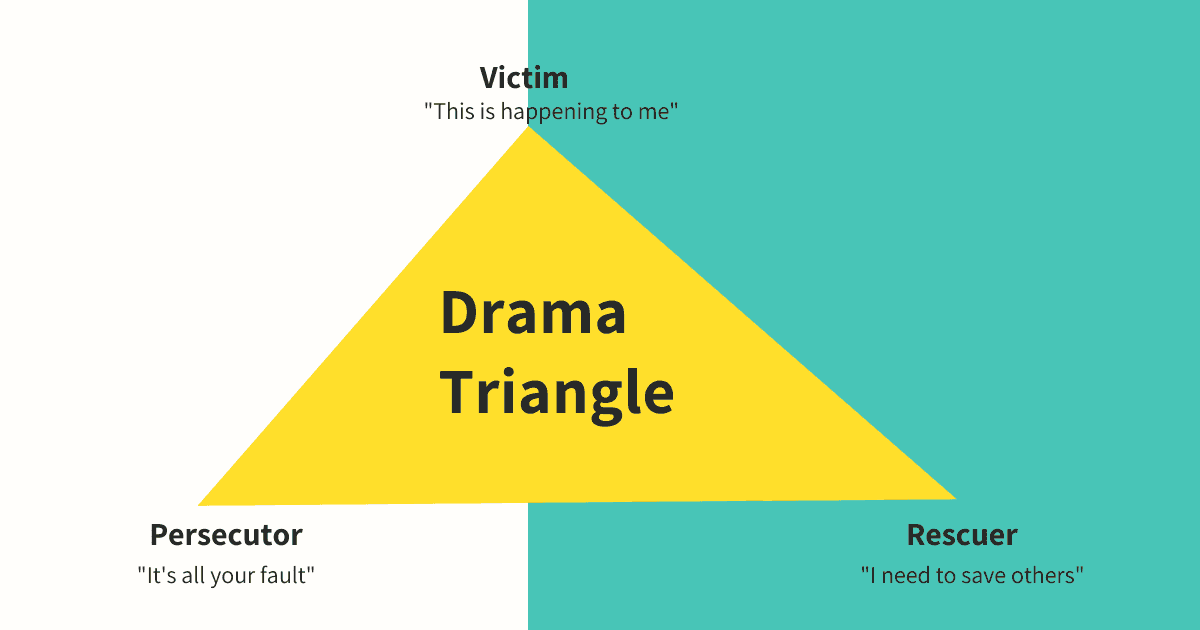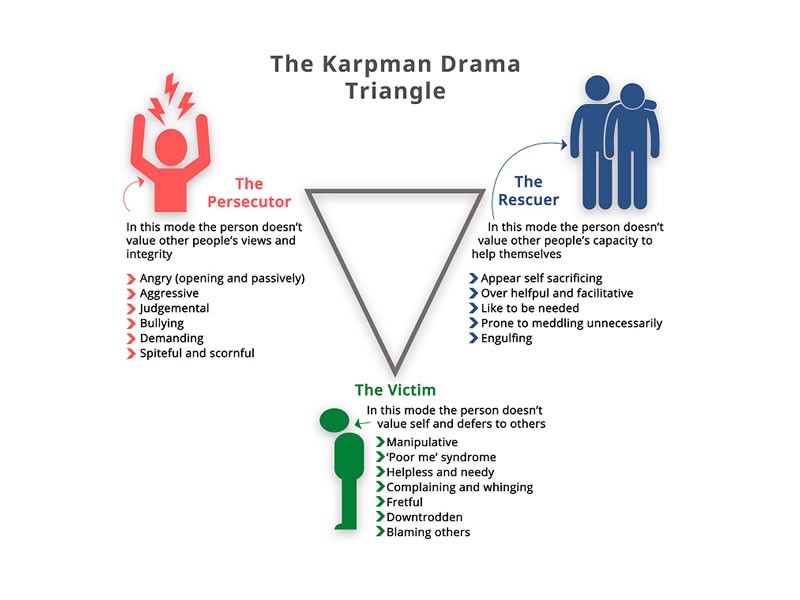Insight Blog
Agility’s perspectives on transforming the employee's experience throughout remote transformation using connected enterprise tools.
8 minutes reading time
(1575 words)
The Winners Triangle – UPDATED 2022 – A Complete Guide
The winner's triangle is a win/win situation for everyone involved. Lets explore the three roles and its impact in the workplace.
Adapted from Karpman's Drama Triangle, Acey Choy's Winner's Triangle [Choy, 1990] shows the three roles without ignoring the abilities and human value of others.
The positions have been renamed to reflect this. To provide a few examples, from persecutor to the powerful, rescuer to responsible, and victim to vulnerable In other words, there are methods of existing in the world that doesn't harm us or anybody else.
Winners Triangle
The Winners Triangle, also known as Empowerment Triangle, has the three positive roles that correlate to the Drama Triangle.
Self-awareness is key to breaking the cycle of negativity and refocusing on the positive aspects of your life. We can't fix something we don't know about. Developing self-awareness takes time, but the more we learn about what sets us off, the better we'll be able to avoid it and avoid the negative consequences that come with it. It is simpler to avoid toxic relationship dynamics if we are aware of the roles we play and accept responsibility for our actions and ideas. Then and only then will we be able to respond appropriately as responsible adults.
We have the power to transform the Drama Triangle into a Winner's Triangle.
Drama Triangle and Winners Triangle
Stephen Karpman, a Transactional Analysis trainer, first devised the Drama Triangle in 1968 as a visual representation of the dance that occurs whenever we blame someone else for how we feel. When we don't accept responsibility for our sentiments, we're participating in the Drama Triangle, according to Karpman. The Drama Triangle is a simple yet useful tool for analyzing the connections in a depressed person's life.
Victim, persecutor, and rescuer make up the drama triangle. Karpman uses an upside-down triangle to depict the link between these three roles. Here, we see the Persecutor and the Rescuer demonstrating their superiority over the Victim.
The triangle indicates the direction of the transactions, but the drama in the Triangle is brought on by the changing of the hats amongst the several players. A person's role or strategy shifts as the triangle is played out. As a result, the other members of the triangle will make the same change. The Victim will eventually turn against the Rescuer because he or she is fed up with being on the bottom. Or, if the Rescuer grows impatient with the lack of acknowledgment or gratitude for their services, they may resort to harassing methods.
Role titles derived from the Drama Triangle have become common usage. If you've ever been in a relationship with a depressive individual, you've probably heard the term "Rescuer" thrown about since you're viewed as being overly helpful. The victim is another term for someone who is depressed. Even though the Drama Triangle clearly demonstrates the problem, it isn't always so simple to break out of the drama. That's why the Winner's Triangle appeals to me so much.
For as long as the Drama Triangle has existed, there have been countless variations and updates. It follows the same basic form as the Drama Triangle, except the adult roles in the Winner's Triangle, are used instead of parent/child roles. This triangle was originally introduced in the 1984 TA Conference presentation delivered by Acey Choy.
A Winner's Triangle has the same role as each of the parts in the Drama Triangle. There are three "OK" jobs in the Winner's Triangle that each demands a distinct set of abilities to succeed.
A useful tool for Vulnerable person is anything that helps them consider their alternatives and the repercussions of their actions. Caring for the Vulnerable necessitates the development of listening skills that include empathizing with the individual. Caring is often as simple as actively listening to what the other person has to say. Getting what you want without resorting to coercion or threats is the essence of assertiveness. In all three positions, self-awareness is crucial.
Winners Triangle Worksheet
Getting out of the Vulnerable Position
It's not uncommon for individuals in the Vulnerable position, like those in the Victim position, to recognize that they're going through a tough moment, but they don't underestimate the ability of their own thinking and emotion in order to work out how to have their needs fulfilled correctly. You may ask for help, and if someone says "no," you're OK and not "bad" just because someone said "no," you understand. They have the option of requesting that others fulfill their desires. The fact that they are going through hardships does not diminish their confidence in their capacity to come up with solutions on their own.
Taking the Responsible Position
Rescuers, like all responsible individuals, have a heart for helping others. Respect for others' capacity to think, feel, and ask for what they want is a trait of responsible individuals. In contrast to Rescuers, responsible individuals are aware of their own feelings and needs and avoid doing things that make them uncomfortable.
They know how to say no in a way that is both honest and courteous to everyone involved. Listening to others without trying to solve their issues is the most important trait of a responsible person.
Being in a Potent Position
Persecutors are powerful persons who actively seek to achieve their goals in the world.
It's not the nature of powerful individuals to pick on and tear down others. Use your power to solve issues instead of punishing or humiliating others. Understanding what you want and dealing with others is critical here. It's time to use your problem-solving talents if the other individual won't budge on your demands.
In our glass-bottomed boat, we use the Drama Triangle and the Winner's Triangle to see what's happening beneath the surface as people engage with one another. They assist us in being more cognizant of our thoughts, feelings, and actions so that we aren't forced to spend our lives in a state of emotional default that we unconsciously developed in order to survive the circumstances in which we grew up.
Opposite of Karpman Drama Triangle
As soon as one individual assumes the role of victim or persecutor, a dysfunctional triangle is formed. Even while none of the roles we play when initiating or joining a conflict scenario is real, each of us has our own default starting gate (or habitual role). For most of us, our default choice is a drama triangle, which is more like role-playing than an actual exchange of thoughts and feelings.
Participants may readily switch between the roles of persecutor, victim, and rescuer, and a shift in one role causes shifts in the other two.
Both punishing others and acting as if you are a victim are harmful. As a result, victims tend to have an external locus of control (a belief that their accomplishments or failures are a result of things outside of their control), and a fixed, rather than development, attitude. It is common for people who play victims to shy away from hard situations and take no chances or new ideas of any type when confronted.
A victim's tendency to dwell unproductively on their ideas and feelings is counterproductive to the goal of helping rather than harming the victim; instead, contemplation must produce 'insight,' which is related to stronger sentiments of self-awareness and self-acceptance.
Victimhood mindsets may also lead to black-and-white thinking, so beware. As a result, we become less sensitive to the suffering of others, which breeds moral elitism ("I'm always right"), a generalization that "persecutors" are "bad sinners," and a justification for the persecution of others. Victims become persecutors when they justify their hostility toward their oppressors, which feeds the vicious cycle already described.
In this day and age of internet shaming and disputes over our purported "cancel culture," it's important to keep this in mind.
As a leader, you may avoid the Drama Triangle by developing a good form of it and operating from the state of "presence."
The Winner's Triangle was designed by Acey Choy in 1990, based on the mature attributes we can all cultivate to challenge the conventional Drama Triangle roles. A model of Choy's is:
- Persecutors utilize their self-assuredness to push people in a positive way and help them grow.
- Rescuers demonstrate their loving side by listening to others and assisting them to discover their own way.
- Victims come to terms with their vulnerability and the fact that they do, in fact, have some control over the situation. They assume personal accountability and learn to address problems.
TED's Empowerment Effect New adult roles are identified based on the following characteristics:
- Persecutor turns into a Challenger.
- The Rescuer is transformed into a Coach.
- The Victim is transformed into a Creator.
What are the Winners Triangle Scenarios?
Challenge the Drama Triangle by acting like 'Adults,' in terms of transactional analysis, and accepting responsibility for our positions without claiming authority over others.
Changing one's position in a dysfunctional triangle can lead to a change in the roles of the other two players, therefore it's important to become more self-aware, see patterns in interactions, and take responsibility for altering those patterns.
Categories
Blog
(2741)
Business Management
(337)
Employee Engagement
(214)
Digital Transformation
(185)
Growth
(124)
Intranets
(122)
Remote Work
(61)
Sales
(48)
Collaboration
(44)
Culture
(29)
Project management
(29)
Customer Experience
(26)
Knowledge Management
(22)
Leadership
(20)
Comparisons
(8)
News
(1)
Ready to learn more? 👍
One platform to optimize, manage and track all of your teams. Your new digital workplace is a click away. 🚀
Free for 14 days, no credit card required.

















